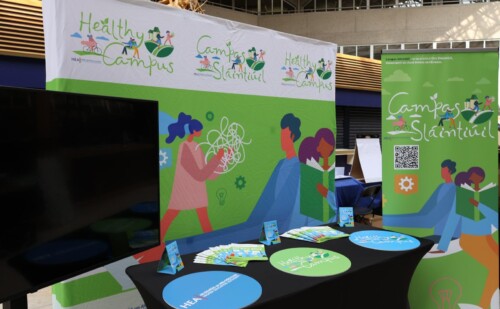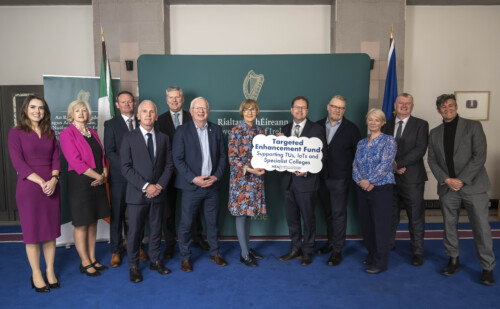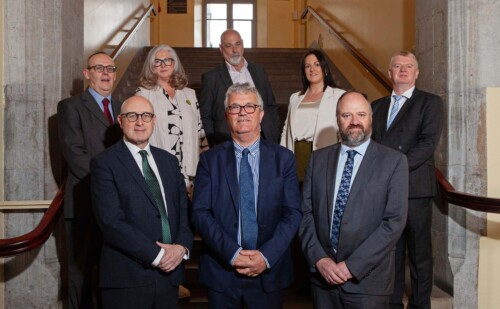Minister Harris launches reports on National Surveys of Student and Staff Experiences of Sexual Violence and Sexual Harassment in Higher Education
By Maura O'Shea
Posted: 27 January, 2022

Minister for Further and Higher Education, Research, Innovation and Science, Simon Harris T.D. has today [27th January] launched the findings of national surveys of student and staff experiences of sexual violence and harassment in higher education.
The Minister officially opened the surveys on sexual violence and harassment in April 2021. The surveys, conducted by the Higher Education Authority, were sent by higher education institutions directly to all students and staff in higher education. A total of 11,417 responses were analysed (7,901 students and 3,516 staff) and inform the findings.
Launching the survey reports, Minister Harris said: “I really want to thank students and staff across the country who took the time to engage with this survey and share their experiences with us.
“Since I have been appointed, my Department and the Higher Education Authority have placed a real focus on ensuring third level is safe and a leader in the calls for change. Crucially, we needed a robust evidence base and this survey gives us vital information to inform further actions.
“The survey findings point to some positive developments in the higher education institutions that can be built upon in areas such as awareness raising and education.
“But there are also some deeply troubling findings, such as the levels of sexual harassment experienced by staff and students that responded to the survey and particularly the female students that reported that they had experienced sexual violence.
“This is a society wide issue and must be urgently tackled. In 2021, I asked all of the HEIs to publish Action Plans to tackle sexual violence and harassment, aligned with the Framework for Consent, and good progress is being made in implementing these across the sector, but there is much more to do.
“My Department has been working closely with officials in the Department of Justice on the development of the Third National Strategy on Domestic, Sexual and Gender-Based Violence, which will be a whole of government strategy based on a zero-tolerance approach central to tackling these issues.”
The Minister met with members of the HEA’s expert Advisory Group on Ending Sexual Violence and Harassment and practitioners of the National Advisory Committee, this morning to brief stakeholders and student representatives.
The surveys collected data from respondents on their experiences of sexual harassment and sexual violence.
The surveys showed that three forms of awareness raising on consent, sexual violence or harassment had been seen by half or more of the students in the survey.
Almost one in ten had taken part in a bystander event or programme or viewed a drama on consent, sexual violence or harassment. First Year students were more likely to have taken part in consent or bystander initiatives, reflecting the roll-out of consent initiatives as part of orientation for students commencing higher education in recent years.
Dr Pádraig MacNeela from NUI Galway led the analysis and reporting on the surveys. He said: “The students and staff who took part in these surveys provided insights on a wide range of topics, across sexual violence, harassment, consent education and supporting others. Taken together, the findings described a varied picture of strengths and resources, negative experiences and gaps in knowledge.
“For example, a majority of people trusted that their college will support them, and a large majority endorsed positive behaviour and active consent. Yet alongside these strengths there were gaps in knowledge about how to make complaints or access supports through their institution. We also identified a high level of sexual violence and harassment experienced by students in particular.
“By taking part in these surveys, students and staff across the country have highlighted for us the priorities that should be addressed to create a positive culture of respect, safety, and consent.”
The survey reports include a number of conclusions and recommendations, which will inform future policy decisions to tackle sexual violence and harassment. These include the following:
- A systematic development programme of awareness raising, education, and training should be made available, supported by HE institutions, and promoted as an important priority.
- Continue work on disseminating easily understandable and accessible policies.
- Build sectoral capacity by supporting examples of good practice that can be shared.
- Devise a long term approach to research on student experiences.
- Support people affected by sexual violence and harassment.
Dr Ross Woods, of the HEA Centre of Excellence for Equality, Diversity and Inclusion stated: “The HEA is committed to ensuring a national campus culture that is safe, respectful and supportive for all staff and students. The Centre will now work with the HEA Advisory Group on Ending Sexual Violence in Higher Education Institutions to implement the recommendations of these reports.”
The survey reports can be accessed here: https://www.gov.ie/en/publication/09bb5-report-on-surveys-of-experiences-of-sexual-violence-and-harassment-in-higher-education/
Anyone impacted by these issues should contact their Higher Education Institution or text 50808 for help. There is also a list of organisations, listed below, which may be able to help.
ENDS
Notes to the Editor
Background to the Surveys
In April 2019, the Framework for Consent in HEIs; Safe, Respectful, Supportive and Positive: Ending Sexual Harassment in Irish Higher Education Institutions was launched. This Framework aims to ensure the creation of an institutional campus culture which is safe, respectful and supportive.
In August 2020, the Minister wrote to HEI Presidents indicating his intention that national surveys of student and staff experiences of sexual harassment and violence would be developed and implemented, to create a robust evidence base for further policy on these issues. The HEA established an expert Advisory Group on Ending Sexual Violence and Sexual Harassment in HEIs in January 2021 to support this work and worked with the group to develop standardised national surveys to monitor student and staff experiences of sexual violence and sexual harassment.
The surveys were conducted in April-May 2021, with the survey link being sent to some 245,000 students and some 30,000 staff members in higher education. A total of 11,417 responses were analysed (7,901 students and 3,516 staff) and inform the findings. The response rate to the staff survey was c.a. 11.7% and to the student survey c.a. 3.2%.
Key survey findings include:
Staff Surveys:
· Campus Safety: Overall, 81% of staff respondents agreed that they felt safe from sexual violence at their HEI, falling to 72% of staff respondents who agreed they felt safe from sexual harassment.
· Education and awareness: Three quarters or more of the staff members agreed that they would be willing to complete training on disclosures (83%), bystander intervention awareness (81%), and consent awareness (76%), if such training was made available by their HEI.
- Sexual harassment: Of the staff that responded to the questions in relation to sexual harassment (n = 2900) ), a quarter described experiencing sexualized comments, nearly one-third described sexual hostility, 60% described sexist hostility.
- Sexual violence: A total of 71% (n = 2,455) of staff members chose to answer some questions in the section of the survey on sexual violence. Low levels of sexual violence were reported by staff who responded to questions in this section. The most common form of unwanted sexual contact was being touched in a way that made them feel uncomfortable (12%).
Student Surveys
- Campus environment: A majority of students agreed that they felt safe from sexual violence and harassment at their accommodation and around the campus. A third or less felt safe socialising at night on campus or in the local community.
- A majority of students said it was likely that their HEI would support a student who made a report of sexual misconduct, and unlikely that their HEI would engage in a negative, unsupportive response.
- Education and awareness: Three forms of awareness raising on consent, sexual violence or harassment had been seen by half or more of the students in the survey (social media campaigns, Students’ Union campaigns, and posters). Three more initiatives had an engagement rate of between one quarter and one third of the students (student publication / media outlet, college orientation / induction, participation in a consent workshop).
- Sexual harassment: Of the students that responded to the questions on sexual harassment (n=7319):
-
- A majority of students said they had experience of sexist hostility. Sexist harassment items included the experience of being treated differently because of gender (67% said this had happened at least once), of offensive remarks (63%), being put down or condescended to because of gender (66%).
- More than half of the participants said they had experienced examples of sexual harassment such as repeatedly being told offensive sexual stories or jokes (54%), unwelcome attempts at being drawn into a discussion of sexual matters (58%), or offensive remarks about appearance, body or sexual activities (57%).
- Sexual violence: Of the students who responded to this set of questions (n = 5962), 14% of the respondents said someone had oral sex with them while they were incapacitated and unable to give consent, while 7% said this had happened when they were physically forced to do so.
- Of the female students who responded to questions on non-consensual vaginal penetration (n = 3237-3363), 34.2% of female students (over 1100 students) experienced non-consensual vaginal penetration through coercion, incapacitation, force, or threat of force.
Supports available for people affected by any of the issues raised:
|
Service
|
Phone
|
Web
|
|
Text 50808
|
Free 24/7 Support in a Crisis – Text ‘HELLO’ to 50808
|
|
|
Samaritans
|
National Helpline – 116 123
|
https://www.samaritans.org/ireland/samaritans-ireland/
|
|
Dublin Rape Crisis Centre
|
Dublin Rape Crisis Centre’s 24-hour helpline – 1800 77 8888
|
Your local Rape Crisis Centre/Network https://www.rapecrisishelp.ie/find-a-service/
|
|
HSE
|
|
|
|
Sexual Assault Treatment Units
|
|
https://www2.hse.ie/sexual-assault-treatment-units/
|
|
Women’s Aid
|
24-hour helpline – 1800 341 900
|
|
|
Men’s Aid
|
National Confidential Helpline – 01 554 3811
|
|
|
My local Garda |
|
https://www.garda.ie/en/crime/sexual-crime/
|
|
HSE My Options
|
Freephone – 1800 828 010
|
https://www2.hse.ie/unplanned-pregnancy/
|
|
LGBT Ireland
|
National Helpline – 1890 929 539
|
|


